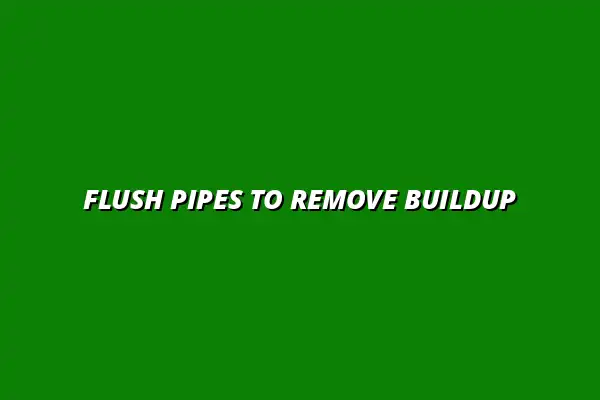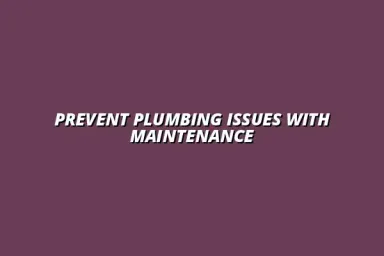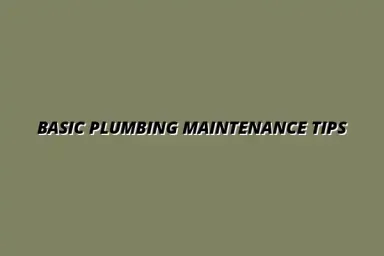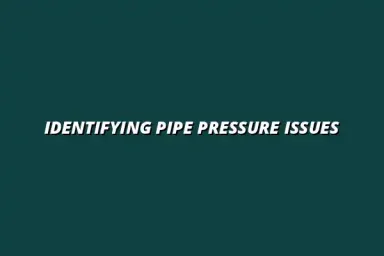Understanding Mineral Buildup in Pipes
Mineral buildup in pipes is a common issue that many homeowners face. This problem mostly arises from hard water, which contains high levels of minerals like calcium and magnesium. Over time, these minerals can accumulate, forming deposits that can affect your plumbing system.
Understanding how mineral buildup occurs is crucial for maintaining the health of your plumbing. If ignored, it can lead to costly repairs and reduced efficiency in your water system. Let’s dive deeper into the impact of these mineral deposits and how to spot them before they escalate into bigger issues! Knowing when to clean your pipes is a crucial first step.
The Impact of Mineral Buildup on Plumbing Systems
When mineral deposits accumulate inside pipes, they can lead to various plumbing problems. These issues can range from reduced water flow to complete blockages that prevent water from reaching your taps. The consequences may be more serious than you think!
- Reduced Water Pressure: Mineral buildup can constrict pipe openings, resulting in lower water pressure.
- Pipe Damage: Over time, excessive buildup can lead to corrosion or burst pipes. In severe cases, you may need to repair or replace your pipes.
- Compromised Water Quality: Minerals can affect the taste and smell of your water.
Understanding these impacts helps you grasp the importance of maintaining your plumbing system. By being proactive, you can save both time and money down the line!
Common Signs Indicating Mineral Accumulation
Identifying mineral buildup early is key to preventing major plumbing issues. Be on the lookout for several telltale signs that indicate you might have a problem. These signs can help you catch the issue before it worsens!
- White or Yellow Stains: Look for discoloration around faucets and sinks.
- Low Water Pressure: Notice if water flow has decreased significantly.
- Weird Odors: An unusual smell can indicate poor water quality due to buildup.
Recognizing these signs early can make a big difference in how you manage your plumbing. If you notice any of these warning signs, it might be time to investigate further! Regular bathroom plumbing checks can help prevent larger problems.
How Mineral Deposits Affect Water Flow and Quality
Mineral deposits not only affect the flow of water, but they also change its quality. As these deposits grow, they can create blockages that hinder the movement of water through your pipes. This can lead to a range of issues that are not just annoying but can also be harmful.
For instance, reduced water flow can lead to higher utility bills, as your plumbing system struggles to deliver the same amount of water. Additionally, the presence of minerals can result in hard water, which can damage appliances over time. This can mean costly replacements down the road! Regular maintenance, like preventing scale buildup in your water heater, is crucial.
- Increased Utility Costs: More energy is needed to heat water, leading to higher bills.
- Appliance Malfunction: Dishwashers and washing machines may wear out faster.
- Skin Irritation: Hard water can cause dryness and irritation to skin and hair.
Ultimately, understanding how mineral buildup impacts your plumbing is essential in ensuring the longevity and efficiency of your water systems. By keeping an eye on these developments, you can take action before they cause major problems!
Identifying Causes of Mineral Buildup in Pipes
Next, let's explore what causes mineral buildup in the first place. Recognizing the sources of hard water is essential for managing this issue effectively. Armed with knowledge, you can take steps to prevent and address this problem!
Maintaining Clear Pipes After Flushing
Once you've successfully flushed your pipes, the next step is to maintain that clarity and prevent mineral buildup from returning. Regular maintenance is key to ensuring your plumbing system runs smoothly. In this section, I’ll share some practical tips on how to keep your pipes clear and healthy!
Preventative measures not only save you from future headaches but also extend the lifespan of your plumbing system. By incorporating a few simple routines, you can avoid the stress and cost that comes with significant mineral deposits. Let's dive into the best practices! For example, regular water pipe cleaning is essential.
Regular Maintenance Tips to Prevent Future Mineral Buildup
To keep your pipes in top shape, consider the following strategies. By adopting these tips, you can effectively minimize the chances of mineral buildup from hard water:
- Install a Water Softener: This device can help remove hard minerals, making your water more manageable.
- Regularly Inspect Your Plumbing: Check for leaks or signs of corrosion that might lead to bigger issues.
- Flush Your System Periodically: Plan to flush your pipes every few years to keep buildup at bay.
- Clean Aerators and Showerheads: Removing mineral deposits from these fixtures can improve water flow. Cleaning your kitchen drain lines is also recommended.
By following these tips, you'll be well on your way to maintaining clear plumbing. Remember, a little effort goes a long way in preserving the health and efficiency of your pipes!
Installing Water Softeners: Benefits and Considerations
Water softeners can be a game-changer for homeowners dealing with hard water. These devices work by replacing hard minerals with sodium or potassium, which helps reduce buildup in your pipes. Here are the key benefits of installing a water softener:
- Improved appliance efficiency: Soft water helps appliances like dishwashers and washing machines work better.
- Longer lifespan for plumbing fixtures: Softened water reduces the wear and tear on pipes and fittings.
- Better skin and hair health: Soft water can leave your skin feeling softer and improve hair texture.
However, it’s crucial to consider your household needs and water usage before making a purchase. Regular maintenance of water softeners is also required to ensure they function effectively. If you need a plumber, consider contacting a local professional such as a plumber in Billesley, Birmingham.
Routine Checks and Cleaning Schedules for Optimal Plumbing Health
Incorporating routine checks into your home maintenance schedule is a smart move. Here’s a simple checklist to help you stay on track:
- Monthly checks: Look for leaks or drips in visible pipes.
- Quarterly cleaning: Remove aerators and clean them to prevent clogging.
- Biannual flushing: Plan to flush your system to ensure optimal flow.
- Annual professional inspection: Hire a plumber to assess your plumbing system for any hidden issues.
By following this schedule, you can catch potential problems early and ensure your plumbing remains in great shape!
Addressing Common Questions Related to Pipe Flushing
It's normal to have questions about flushing pipes and maintaining plumbing systems. In this section, I’ll tackle some frequently asked questions to help clarify any uncertainties you might have!
Understanding the significance of these practices can empower you to take better care of your plumbing. Let’s jump into the common concerns!
FAQs About Flushing Pipes to Remove Mineral Buildup
Here are some of the most common questions I hear regarding flushing and maintaining clear pipes:
- How often should I flush my pipes? It's generally recommended to flush your pipes every 1-3 years, depending on your water quality.
- What are the risks of not addressing mineral buildup? Ignoring the issue can lead to reduced water flow, damaged pipes, and costly repairs.
- Can I flush my pipes myself? Yes! With the right tools and knowledge, flushing can be a DIY task.
By staying informed on these aspects, you can ensure your plumbing continues to function without major interruptions!
How Often Should I Flush My Pipes?
Flushing frequency depends on your water hardness and "

 Kiran Almasi
Kiran Almasi

